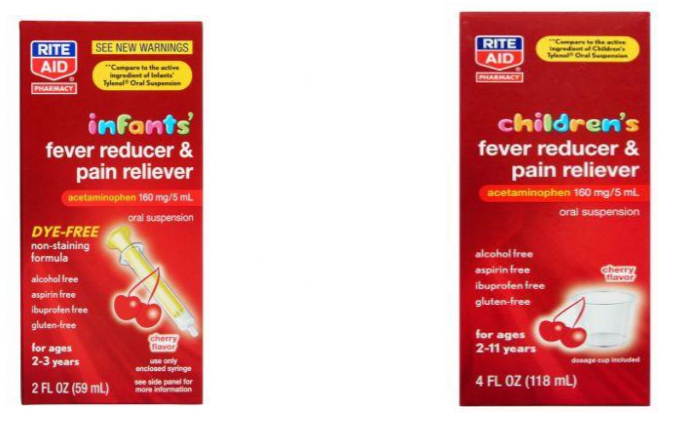Lawsuit Claims Rite Aid Charges Different Prices for Same Pain Reliever Marketed to Infants, Children
by Erin Shaak
Ostermeier-McLucas v. Rite Aid Corporation
Filed: July 1, 2020 ◆§ 1:20-cv-02915
A class action challenges the manner in which Rite Aid markets, prices and sells its brand of acetaminophen pain and fever relievers for infants and children.
A proposed class action alleges the manner in which Rite Aid markets, prices and sells its brand of acetaminophen pain and fever relievers for infants and children dupes buyers into paying different prices for essentially the same product.
At the center of the case out of New York are Rite Aid’s Infants’ Fever Reducer & Pain Reliever and Children’s Fever Reducer & Pain Reliever products. Although the two over-the-counter medicines contain “the same exact amount of acetaminophen in the same dosage amounts,” the product marketed for infants is sold at a “substantially higher cost” than its children’s counterpart, the lawsuit alleges.
According to the suit, no reasonable consumer would pay a premium price for an infants’ medication that amounts to “nothing more” than a children’s equivalent unless they were deceived into believing infants cannot safely take children’s products.

The lawsuit explains acetaminophen, the active ingredient in both Rite Aid pain relievers, has been linked to several child deaths due to mix-ups involving dosage amounts. As a result, the FDA in 2011 informed the public that liquid acetaminophen marketed for infants would thereafter be available only in 160 mg/5 mL concentrations—the same concentration available in products marketed toward children—to avoid accidental toxicity, the case says.
According to the complaint, the potential risk of acetaminophen overdose in children “terrifies” parents and caregivers into taking extra caution when purchasing medication. Rite Aid, the lawsuit alleges, “exploits this fear” by misleading consumers with regard to the age group for which its products are supposedly appropriate.
Echoing a similar case filed this week against Walmart, the lawsuit claims Rite Aid’s advertisements, marketing representations and placement of the Infant’s and Children’s Fever Reducer & Pain Relievers in its brick-and-mortar stores are “misleading, untrue, and likely to deceive reasonable consumers.” The complaint notes the two medications are intentionally packaged with “distinctive and colored lettering” of the words “Infants’” and “Children’s” on the front labels.
Despite the clear distinction between the two products, they contain “the same exact amount of acetaminophen in the same dosage amounts,” the suit asserts, with the only difference being the dosing instrument—a syringe for the infants product and a plastic cup for the children’s product.
The lawsuit alleges that Rite Aid charges approximately three times more for the infant pain reliever product than it does for the children’s product even though the two medications are essentially the same and appropriate for both infants and children with the dosage adjusted based on the weight and age of the child.
Based on the defendant’s representations, however, reasonable consumers such as the plaintiff mistakenly believed the infant pain reliever product was “specifically formulated and designed for infants”—and were therefore willing to pay a premium price for the medication.
“If Plaintiff knew that the Infants’ Products were nothing more than the Children’s Products, she would not have purchased the Infants’ Products or paid a price premium for the Infants’ Products,” the complaint states.
The plaintiff, the caretaker of her nine-year-old child and three-year-old granddaughter, looks to represent anyone who purchased Rite Aid’s Infants’ Fever Reducer & Pain Reliever product for personal use in the U.S., with a proposed subclass of those who did so in New York.
Get class action lawsuit news sent to your inbox – sign up for ClassAction.org’s newsletter here.
Video Game Addiction Lawsuits
If your child suffers from video game addiction — including Fortnite addiction or Roblox addiction — you may be able to take legal action. Gamers 18 to 22 may also qualify.
Learn more:Video Game Addiction Lawsuit
Depo-Provera Lawsuits
Anyone who received Depo-Provera or Depo-Provera SubQ injections and has been diagnosed with meningioma, a type of brain tumor, may be able to take legal action.
Read more: Depo-Provera Lawsuit
How Do I Join a Class Action Lawsuit?
Did you know there's usually nothing you need to do to join, sign up for, or add your name to new class action lawsuits when they're initially filed?
Read more here: How Do I Join a Class Action Lawsuit?
Stay Current
Sign Up For
Our Newsletter
New cases and investigations, settlement deadlines, and news straight to your inbox.
Before commenting, please review our comment policy.